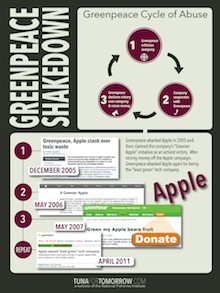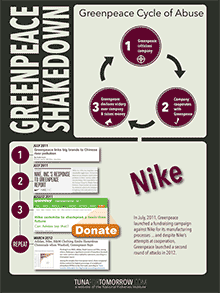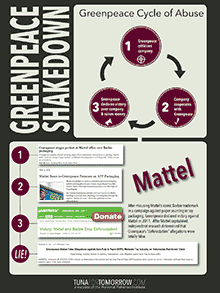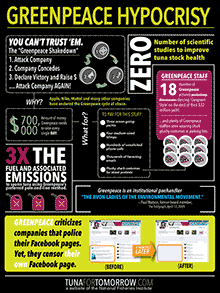ItŌĆÖs been said that there are three types of people in the world ŌĆō those who make things happen, those who watch things happen, and the last group who stand around asking, ŌĆ£what just happened?ŌĆØ
GreenpeaceŌĆÖs muddled criticism of a breakthrough proposal on long-term tuna sustainability this week confirms the multi-issue extremist groupŌĆÖs place in the ŌĆ£what just happenedŌĆØ category.
Last month in Bangkok, the International Seafood Sustainability Foundation (ISSF) announced an important proposal to limit the capacity of global tuna fishing fleets and share data on catches. It represents the first steps toward a property rights-based system of fisheries management that will ensure the long-term health of global tuna stocks.
Greenpeace is opposed to this but theyŌĆÖre not sure why.
ŌĆ£The industry is only talking about the ŌĆślimiting the growthŌĆÖ of fleets,ŌĆØ gripes Sari Tolvanen, GreenpeaceŌĆÖs Oceans Campaigner. In fact, the ISSF proposal caps the number of vessels and their capacity to fish. ThatŌĆÖs an important distinction thatŌĆÖs lost on Tolvanen.
Ms. Tolvanen complains ISSF has failed to provide a public list of vessels. Actually, a public list is the second step of the proposal, ŌĆ£ISSF will establish a record of large-scale pure seining vessels fishing for tropical tunas globally.ŌĆØ ItŌĆÖs right there in the news release. You can register online right now.
In the end, Ms. Tolvanen attempts to drum up some outrage by railing against the ŌĆ£collective secrecy of [industryŌĆÖs] plan to increase tuna fishing capacity.ŌĆØ Again, the proposal is clearly intended to control fishing capacity and to do so in the most open and transparent manner. ThatŌĆÖs the whole point.
Sari Tolvanen is out of her depth on this issue. The ISSF proposal is an important first step toward solving the complex challenge of managing tuna stocks for generations to come. It calls for direct action by industry based on science and research. And it takes the realities of the marketplace into account so that participants have an incentive to support the program and conserve fish stocks for generations to come.
Greenpeace isnŌĆÖt involved in the development of real tuna sustainability solutions and now is wondering ŌĆ£what just happened?ŌĆØ Ms. TolvanenŌĆÖs indignation is just another reminder that rather than take a seat at the table and participate in constructive dialogue and solutions, Greenpeace prefers to once again be ┬Āa heckler in the grandstands.








